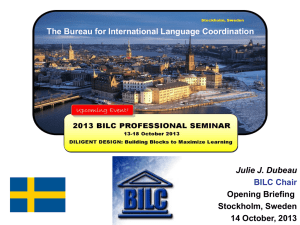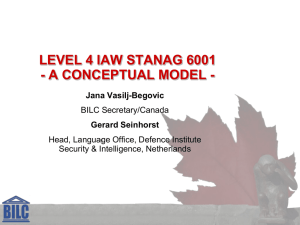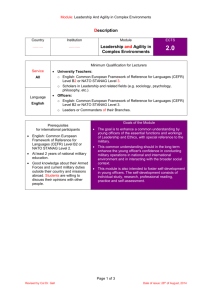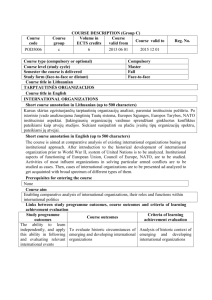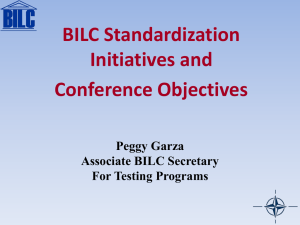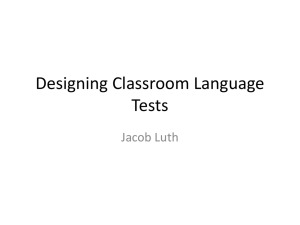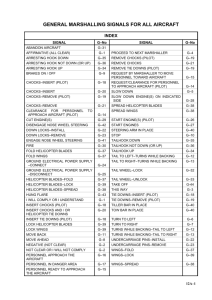Conference Themes and Study Group Topics
advertisement
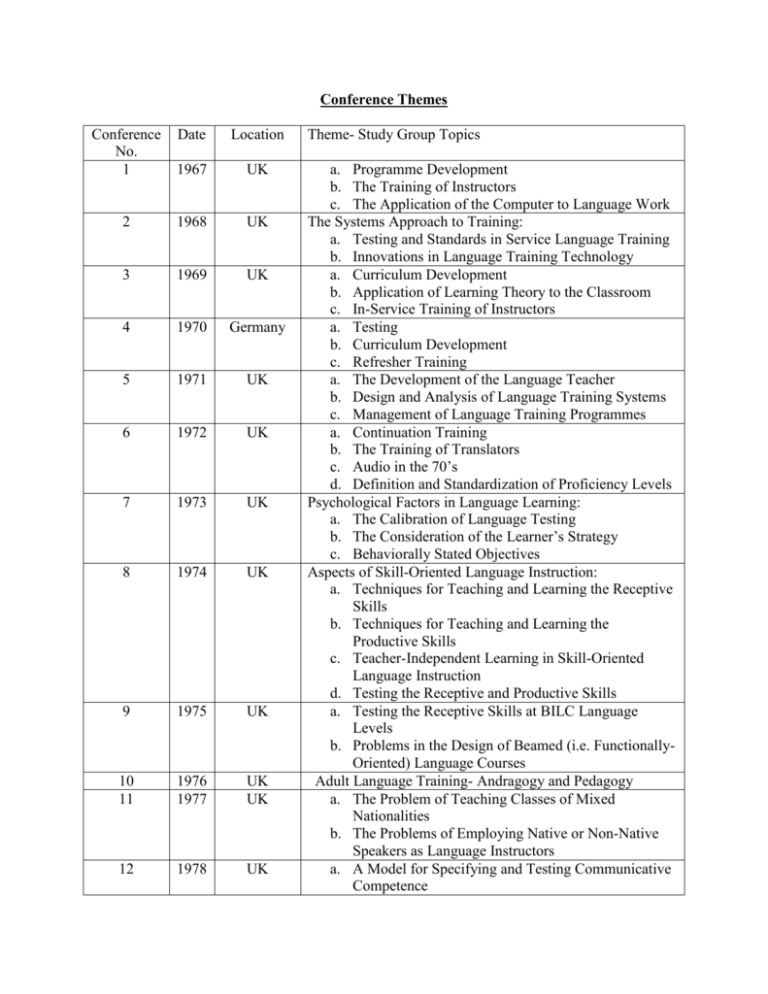
Conference Themes Conference No. 1 Date Location 1967 UK 2 1968 UK 3 1969 UK 4 1970 Germany 5 1971 UK 6 1972 UK 7 1973 UK 8 1974 UK 9 1975 UK 10 11 1976 1977 UK UK 12 1978 UK Theme- Study Group Topics a. Programme Development b. The Training of Instructors c. The Application of the Computer to Language Work The Systems Approach to Training: a. Testing and Standards in Service Language Training b. Innovations in Language Training Technology a. Curriculum Development b. Application of Learning Theory to the Classroom c. In-Service Training of Instructors a. Testing b. Curriculum Development c. Refresher Training a. The Development of the Language Teacher b. Design and Analysis of Language Training Systems c. Management of Language Training Programmes a. Continuation Training b. The Training of Translators c. Audio in the 70’s d. Definition and Standardization of Proficiency Levels Psychological Factors in Language Learning: a. The Calibration of Language Testing b. The Consideration of the Learner’s Strategy c. Behaviorally Stated Objectives Aspects of Skill-Oriented Language Instruction: a. Techniques for Teaching and Learning the Receptive Skills b. Techniques for Teaching and Learning the Productive Skills c. Teacher-Independent Learning in Skill-Oriented Language Instruction d. Testing the Receptive and Productive Skills a. Testing the Receptive Skills at BILC Language Levels b. Problems in the Design of Beamed (i.e. FunctionallyOriented) Language Courses Adult Language Training- Andragogy and Pedagogy a. The Problem of Teaching Classes of Mixed Nationalities b. The Problems of Employing Native or Non-Native Speakers as Language Instructors a. A Model for Specifying and Testing Communicative Competence 13 1979 UK 14 1980 SHAPE 15 1981 France 16 1982 Canada 17 1983 Germany 18 1984 Belgium 19 1985 Italy b. Language Courses for Special Purposes Focus on the Learner: a. Job and Task Analysis and Testing b. Individualization c. Motivation and Demotivation The Functional/ Notional Approach to Language Training in the NATO Context a. The Conceptualization of a Programme (Curriculum/ Syllabus) Towards the Development of the Functional/ Notional Approach to Teaching Languages in the NATO Context b. The Implications of the Functional/ Notional Approach for Task Analysis and Testing Within NATO c. Individualism and the Functional/ Notional Approach d. Strategies for the In-Service Training of Teachers in Military Language Schools Towards the Adoption of the Functional/ Notional Approach The Performance-Rating of Language Instructors and the Inculcation of Creativity in Language Instructors a. Criteria for Recruitment and Training of Language Teachers In BILC Member Countries) b. Evaluating and Controlling Teacher Performance c. Creativity in Language Teaching d. Guided Self-Help Learning The Impact of Advances in Instructional Technology Upon Second Language Learning a. Audio Languages Labs b. VCR and Second Language Training c. Computer Assisted Instruction (CAI) and Second Language Learning Accessing Language Aptitude and Proficiency a. Language Aptitude Tests, Placement, and Counseling b. Language Aptitude Testing, Needs Analysis and Selection c. Language Proficiency Testing and the Curriculum d. Language Proficiency Testing and the Teacher Effective Language Learning Strategies for Military Requirements a. Brain and Memory Research b. Inner Speech c. Proxemics and Kinesics Identify and Controlling Major Parameters Governing the Duration of Military Language Training, Specifically: a. Aptitude and Learning Styles b. Course Format 20 1986 USAMonterey 21 1987 Portugal 22 1988 Germany 23 1989 Spain 24 1990 Canada 25 1991 Turkey 25a 1991 Turkey 26 1992 France c. Self-Study Strategies for Attaining More Effectiveness and CostEfficiency in Military Language Training with Emphasis on Educational Technology a. Language Testing b. Course Format c. Self-Study d. Course Design for Military Communication Skills Strategies for Cost-Effective Military Language Instruction With Emphasis on the Integration of Area Studies a. Task Analysis and Testing b. Program and Staff Development c. Self Study d. Area Studies Professional Development of Language Teachers a. Task Analysis and Testing b. Program and Staff Development c. Self Study International Cooperation in the Development and Implementation of Strategies Towards More Cost-Effective Training/ Teaching For the Retention and Maintenance of Foreign Language Skills a. Standing Group on Task Analysis and Testing b. Self Instruction Proficiency-Based Curricula and Tests in Military Language Training a. Standing Group on Task Analysis and Testing b. Self-Instruction/ Exchange Between Member Nations c. Language Training for Arms Control d. The Implications for Military Language Training of Political Changes in Europe and Elsewhere New Targets and Strategies For Essential Military Language Training in the Changing World- As Exemplified By JobSpecific Communicative Proficiency in Arms Control Tasks, Changing Military Force Levels and Future Directions a. Standing Group on Task Analysis and Testing b. Language Training for Arms Control c. Exchanges Between Member Nations d. Cost-Effective and Proficient Management of Language Training Resources Language Training For Arms Control Verification Purposes (Seminar) Overcoming Language Barriers to Defense Cooperation, With Particular Regard to Multi-National Forces a. Standing Group on Task Analysis and Testing b. Language Training for Arms Control 26a 27 1992 1993 France USAMonterey 28 1994 Italy 29 1995 Germany 30 1996 USASan Antonio 31 1997 Denmark c. Exchanges Between Member Nations d. Defining Military Language Requirements Learning to Learn (Seminar) Achieving Greater Effectiveness in Military Language Training By Applying the Most Recent Developments in Learning Techniques and Technology (Specifically in Regard to Computers, Teleconferencing Facilities and Audio/ Visual Equipment) a. Standing Group on Task Analysis and Testing b. Language Training for Arms Control and UN Operations c. Educational Technology d. Defining Military Language Requirements Quality Control of All Aspects of Military Language Training a. Language Training For Special Purposes b. Supporting NACC Countries c. Quality Control d. Educational Technology as Applied by Member States Meeting the Increasing Language Training Requirements in the Post Cold War Era: - Maintaining Standards in an Environment of Diminishing Resources; - Prioritizing Programmes; - Military Versus Commercial Delivery - Impact on Operational Capabilities Including Peacetime Missions and Regional Contingencies. a. Defining Language Training Standards b. Supporting NACC Partners c. Quality Control d. Educational Technology Optimizing Teacher Selection, Training, and DevelopmentDesigning and Conducting Language Training For Special Purposes a. Optimizing Teacher Selection, Training, and Development b. Supporting NACC/PfP Partner Nations c. Designing Crash Courses and Contingency Packages d. Educational Technology Flexible Delivery Options for Language Training a. Flexible Delivery Options for Language Training b. Designing Crash Courses and Contingency Packages c. Intensified Cooperations Within BILC d. Amplification of STANAG 6001, Including the Role of Interpreting and Translation 32 Coordination and Cooperation in the 21st Century a. Defining and Meeting Language Training Requirements for Multi-National Peace Support Operations b. Intensified Sharing of Resources in Testing and Assessment c. Improving Performance Through Technology d. Defining the Roles of Teachers in the 21st Century 1999 Netherlands Lessons Learned- 33 Years of BILC a. Components of an Effective Language Program b. Language Training for Special Purposes c. Evaluating Teacher Effectiveness 1998 UK 34 2000 Ottawa, Canada Task-based Approaches in Language for Operational Purposes (LOP) Instruction and Performance-Based Testing a. New Developments in Distance Learning and Their Applications to Operational Language Training b. Teacher and Student Motivation in the Light of Technological Changes in the New Millennium c. Designing & Developing Teaching & Testing Materials 35 2001 Segovia, Spain New Challenges for BILC in the 21st Century a. New Developments in Distance Learning and Their Applications to Operational Language Training b. How Teachers Can Help Students Learn From Internet Sources c. Motivation in the Light of Technological Changes in the New Millennium d. Evaluating the Quality of Language Programs 36 2002 Oslo, Norway Managing National Language Programs: Assessing Needs and Delivering Instruction a. Moving Teachers and Students From the Textbook to the Real World b. Conducting Language Needs Assessments: Setting Job-Related Language Requirements c. Teaching Operational Language, NATO Terminology and Acronyms. 37 2003 Harrogate, UK 33 Evaluation and Validation: Measuring the Effectiveness of Language Learning a. How Do You Measure the Effectiveness of Classroom Instruction? b. Central Principles of Curriculum Design and Development. c. Teaching According to the STANAG 6001 Scale d. Fairness and Validation in Language Assessment 38 2004 Strasbourg, France Language Programmes: Military/ Civilian Connections a. BILC Virtual Center of Excellence b. Maintaining and Enhancing Language Proficiency c. Preparing and Screening Military Personnel for NATO Positions and Courses 39 2005 Hurth, Germany Technology-Enhanced Language Learning, Teaching and Testing a. Distance Learning b. Challenges and Limitations of Technology c. STANAG 6001 and the Common European Framework d. Technology Enhanced Language Teaching e. Conducting Job Analyses to Determine Operational Language Requirements 40 2006 Budapest, Hungary Aligning program goals, instructional practices and outcomes assessment. a. Increasing efficiency of language training programs b. Evaluating the performance of language teachers c. Setting, communicating, and measuring program goals d. Standardizing language training programs e. Teaching English in mixed nationality classes f. Language for specific purposes: goals, practices, assessment and teacher training 41 2007 San Antonio, Texas Language Implications of NATO's Expanding Roles a. Language policy/program changes after Riga b. Language program for counterterrorism c. Language teaching/interpretation issues for NATO missions d. Ascertaining requirements for languages other than English e. Standardizing testing in NATO/PfP 41 2008 Athens, Greece General Proficiency and Specialized Needs: The Philosophical Implications of Education vs. Training Study Group 1: Integrating language education and training into military career development Study Group 2: Common European Framework (CEF) Study Group 3: Conducting language needs analyses for NATO Study Group 4: Harmonizing NATO operational language courses Study Group 5: BILC website and communications Meeting of Benchmark Advisory Test Working Group 42 2009 Rome, Italy “Bridging the Gap: Language Requirements vs. Language Reality” 43 2010 Istanbul, Turkey 44 2011 Vilnius, Lithuania 45 2012 Prague, Czech Republic Study group #1: ADL Course in English for Military Operations Study group #2: Managerial Issues in a Testing Cell Study group #3: BILC website content building Study group #4: Center of Excellence (COE) for Language Training? Study group #5: Narrowing the Gap Between Training Limitations and Training Needs “Mapping The Road: Success in Language Training”. Study group #1: CEF-R / STANAG 6001 Ed. 3 Comparisons Study group #2: BILC National Reports – Review Study group #3: NATO STANAG 6001 Ed 3 - Level 4 Testing Study group #4: Review of Linguistic Requirements for CE/PE Posts “Developing Operational Proficiency”. Study group #1: Guidelines for English Native Speakers (NS) for Enhancing Communication Study group #2: Establishing Strategic Guidance for BILC Study group #3: Military Terminology and Translation Study group #4: Future BILC Themes, sub-Themes and Study Group Topics Study group #5: STANAG for Non-Specialists Meeting of the Working Group on Level 4 Testing TBD
